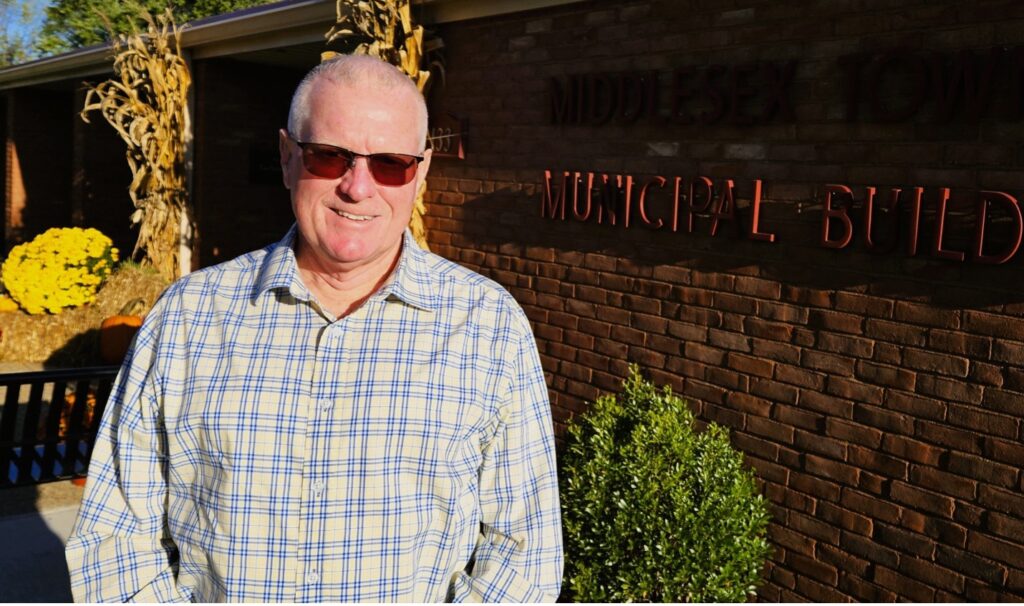When Jeff Winkle took the job as Middlesex Township Manager three years ago, it wasn’t a step into the unknown — it was a return to familiar ground. He began his public service career just west along the Route 228 corridor in Cranberry Township. Now, on the eastern stretch of that same highway, he’s applying three decades of experience to help Middlesex manage growth, preserve its character, and plan for what’s coming next.
“If you’d asked me 30 years ago if I’d ever become a township manager, I would’ve laughed,” Winkle said. “I had no idea back then where local government work would lead.”
A Career Built During Cranberry’s Boom
Winkle started in Cranberry Township in the early 1990s as a code enforcement officer, working out of the old municipal building before the region saw explosive change. Over the next 15 years, he advanced to zoning officer, planning director, and community development director, holding multiple roles as Cranberry became one of the fastest-growing communities in Pennsylvania.
“Cranberry was like a training ground for everything that would come later,” he said. “You learn a lot being part of that kind of growth — how to plan for it, how to communicate with residents, how to make government work.”
He watched firsthand what happens when a township grows faster than it plans, and how long-term thinking can prevent bigger problems later. Those lessons would follow him east on 228.
From Local Government to the Private Sector
After his time in Cranberry, Winkle spent 13 years in the natural gas industry during the height of the Marcellus shale boom. He worked in land acquisition and development, drawing heavily on his municipal planning and zoning background.
“It was a different world, but it tied back to what I already knew,” he said. “Land is land — whether you’re regulating it or acquiring it.”
Before coming to Middlesex, he returned to public service as planning director in Bethel Park, where his mix of private- and public-sector experience put him directly at the intersection of development, regulation, and local decision-making.
Education Shaping Leadership
Winkle holds a bachelor’s degree in Human Resources from Geneva College and a master’s degree from Mountain State University. He describes his leadership style as “servant-focused and respectfully direct.”
“I’m here to lead, not dictate,” he said. “My job is to guide the team, listen well, and make decisions that hold up long term.”
Stabilizing Middlesex After Turnover
Before Winkle arrived, Middlesex Township had cycled through several managers in a short period. Staff and supervisors were ready for someone who could stay, set a direction, and bring consistency.
“One of the first things I focused on was stability,” he said. “People need to know what to expect from their township — staff, supervisors, and residents included.”
The Board of Supervisors saw his mix of planning, land use, and leadership experience as a fit for the kind of growth already moving east along the 228 corridor.
Planning for Growth and Preserving Identity
One of the most significant changes under his leadership was the long-delayed update to the township’s comprehensive plan — the first major revision in nearly 20 years.
“We’re not trying to be Cranberry or Adams,” he said. “But we are affected by where we sit, and the 228 corridor is the connector. You can’t ignore it — you need to plan around it.”
Housing developments like Siena Village and Rightmyer Estates, along with commercial proposals, are reshaping both the tax base and the expectations of residents. With those changes come practical considerations — police coverage, traffic flow, zoning enforcement, and public perception.
Meeting Service Expectations
Winkle said growth brings a demand for services, especially in public safety. The township is working toward 24/7 police coverage, but staffing and budgeting have to stay aligned with needs.
“It’s about pacing,” he said. “You grow the services as you grow the community — not before, not after.”
Communicating With Residents
He acknowledged that residents sometimes misunderstand development decisions or assume growth is happening without oversight.
“That’s something we’re working on — making sure people understand the ‘why’ behind what happens here,” he said. “If people feel informed, they’re more trusting.”
East of 228, but Informed by the West
From code enforcement to land acquisition, from zoning to planning, Winkle’s time on the western side of Route 228 shaped the way he now leads on the eastern side.
“What I’m doing here is the product of everything I’ve done — public sector, private sector, planning, land, leadership,” he said. “It’s all connected. And for me, it just came full circle along 228.”
